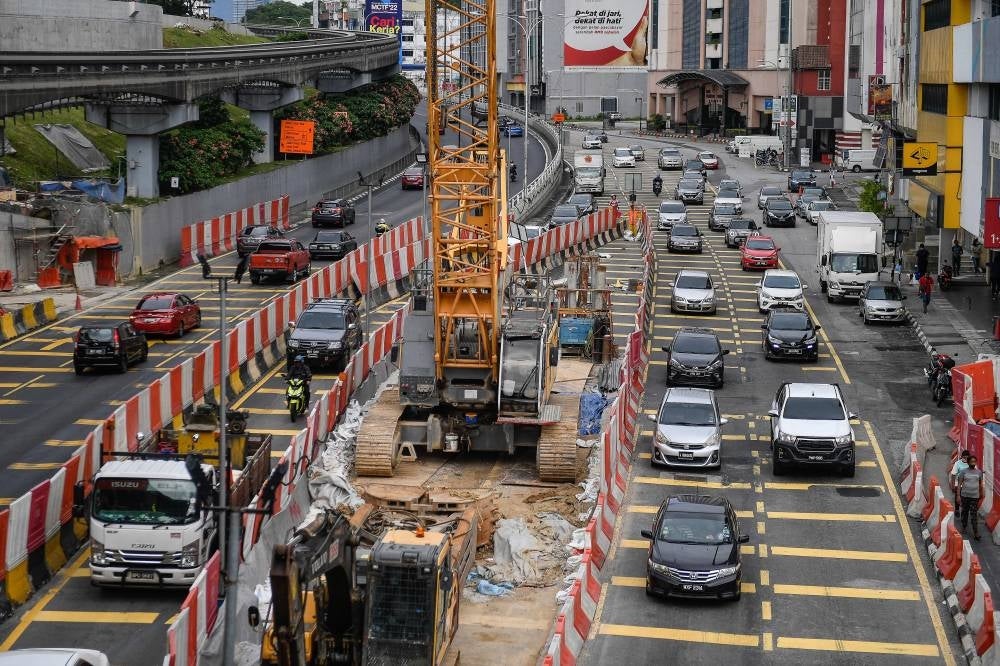Traffic Woes: Effective management plans near construction sites needed - experts

KUALA LUMPUR, July 9 (Bernama) -- Traffic management plans, especially those located near construction areas, need to be carried out more comprehensively and effectively to immediately reduce traffic congestion in the capital.
Universiti Teknologi Mara (UiTM) Civil Engineering lecturer, Associate Prof Dr Masria Mustafa, said the construction projects carried out simultaneously, due to delays caused by the implementation of the Movement Control Order (MCO) for more than two years, have resulted in haphazard traffic control.
Therefore, Masria, who is also a lecturer in Traffic and Transportation Systems, proposed that the Kuala Lumpur City Hall (DBKL) coordinate the traffic system more closely, including aspects of road closures implemented in different construction areas, as well as monitoring if there are non-compliances that could lead to revocation of the original approval.
"Every agency involved in construction must be responsible; there must be communication between them. For example, large construction structures to be brought in, of course, need road planning involved, and also if they require road closures.
"Similar to the current situation, there is no coordination, so the parties involved such as developers and different contractors do not know about traffic control in other areas, so the traffic will be uncontrolled and there will be many 'bottlenecks' that cause congestion,” she told Bernama.
Citing an example of the implementation of the ban on heavy vehicles exceeding 7.5 tonnes entering the city centre during peak hours by DBKL at the end of last month, Masria said that the implementation was seen as difficult to achieve if not implemented in an integrated manner by local authorities (PBT) throughout the Klang Valley.
"These heavy vehicles may take other routes, such as through the roads in Petaling Jaya, managed by the Petaling Jaya City Council (MBPJ), which does not implement the same rules, so the problem of congestion will still occur because the movement and route of vehicles involve the entire Klang Valley,” she said, while suggesting that communication between agencies and ministries, especially Works and Transport Ministries, be carried out more proactively.
Masria is also of the view that the construction of more highways such as Petaling Jaya Dispersal Link (PJD Link), Bangi-Putrajaya Expressway (BPE) and KL Node, which are reported in the research and approval process, will not be able to overcome traffic congestion and are feared to worsen the situation.
"Increasing road capacity will cause people to continue the habit of driving (using private vehicles), which is supported by the theory of induced demand, and this congestion problem will not be solved," she said. She was also worried about the impact on the environment.
Also sharing a similar view is a road safety expert from Universiti Putra Malaysia, Professor Dr Kulanthayan K.C. Mani, who is of the view that the construction of the highway will only lead to an increase in private vehicles.
"More lanes being offered will also lead to more bottleneck situations where vehicles reduce speed to merge (into a single lane), and in turn slow down the flow of traffic,” he said.
Kulanthayan said that the number of vehicles in the country was seen to have surpassed the human population, with an increase of at least one million vehicles annually since 2019, with 33.3 million vehicles registered last year, compared with the human population of 32.6 million.
The executive director of Safe Kids, among others, also suggested immediate measures, such as a thorough study of the implementation of work from home, and maximising services that can reduce the movement of private vehicles on the road to be implemented more widely as the public transport system is not yet fully completed. - BERNAMA










